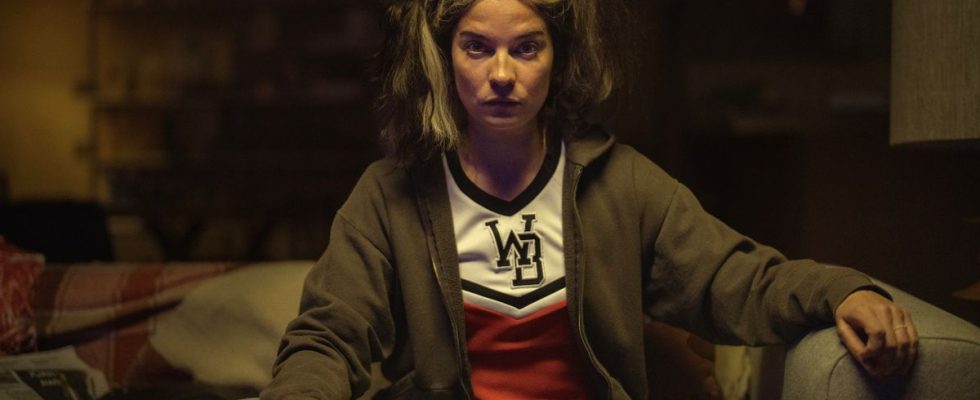Netflix is obviously not afraid to be self-critical. black-mirror, created by Charlie Brooker, whose five episodes of season 6 are accessible this Thursday on the streaming platform, attacks its broadcaster and its audience directly, otherwise it would not be funny. The dystopian series has accustomed us to seeing each episode as a magnifying mirror of our society’s flaws, showing the perverse effects of our digital uses. Season 6 is obviously no exception to the rule. Through its first two episodes – Joan is awful And Loch Henry –, she dissects our ways of consuming streaming platforms and paints a very critical portrait of Netflix, which has the particularity of hosting it. How is the web giant being bullied by its own blockbuster?
The first two episodes revolve around the same subject: the online cultural offer. Joan is awful (Joan is awfulin French), worn by Annie Murphy (Welcome to Schitt’s Creek) and Salma Hayek Pinault (Frida, one night in hell), recounts how Joan’s ordinary life changes when she discovers a program bearing her name on Streamberry, which looks just like Netflix. Kind of docu-fiction in real time, Joan is awful reproduces the acts and gestures of the young woman in the guise of Salma Hayek and presents her in an absolutely atrocious light.
The power of streaming platforms
Overnight, Joan’s ordinary daily life is judged by millions of streamers who are unaware of the violence they are subjected to. She loses her job, gets dumped by her fiancé and there’s nothing she can do about it. Like most people, she signed Streamberry’s terms of service without reading them. She cannot attack Salma Hayek either, the platform developed this program from images generated by artificial intelligence backed by the power of a quantum computer. The movie star did not actively participate in this work.
black-mirror sheds ironic light on a system that exploits the personal data of its users. In the end, Joan can only blame herself. It was enough to read the thousands of pages that make up the terms of use to guard against such a nightmare. And if she didn’t want us to track her actions, all she had to do was deactivate geolocation and turn off her spy cell phone to avoid seeing her conversations recorded and reused in a television work.
Netflix’s portrait becomes particularly sour when the episode unveils the real issues behind Joan is awful. During an interview with a journalist, the leader of Streamberry explains why they chose this young woman in particular. “We wanted an average, absolutely unremarkable person to test the system. Joan is awful is just the beginning, the goal is to launch unique programs tailored to each of our 800,000,000 users created by our systems. Users will be able to truly identify themselves”, points out the manager with ease before explaining the use of the term “horrible”. “We tested more positive content with a panel, but our subjects did not believe it, they did not find their neurotic vision of themselves in it. »
The fascination for true crimes
Speaking of neurosis and taste for scandalous content, episode 2 gives a layer, tackling Netflix again in passing. Loch Henry puts a spotlight on the true crimes, vein so dear to the streaming giant. Pia and Davis, a couple of filmmakers, arrive in a small Scottish town to shoot a nature documentary, but when Pia discovers that a serial killer named Iain Adair has been around for years, she smells the right one. affair. She begs Davis to dig into this story which has nevertheless shaken the family of the latter and to sell the concept to a producer. Only problem: Iain Adair is not as well known as Ted Bundy or Jeffrey Dahmer, it is necessary to find a sufficiently sordid and voyeuristic angle to attract the public. Luckily, Davis’s father was one of the killer’s victims.
Through these two ultra-cynical episodes, the anthology series questions users’ taste for the obscene – remember that Dahmer is one of the most-watched series on Netflix – and how the platforms use this unhealthy fascination to make money. The race for “engaging” content annihilates any consideration of ethics. And, if we put aside the technological brakes – the quantum computer is far from being perfected and the AIs do not yet know how to generate such content -, we could forget that black-mirror projects a dystopian future. The description sounds like the world we live in. Finally, the series signed Charlie Brooker always talks about the excesses of our society and its technological headlong rush. And that is chilling.

